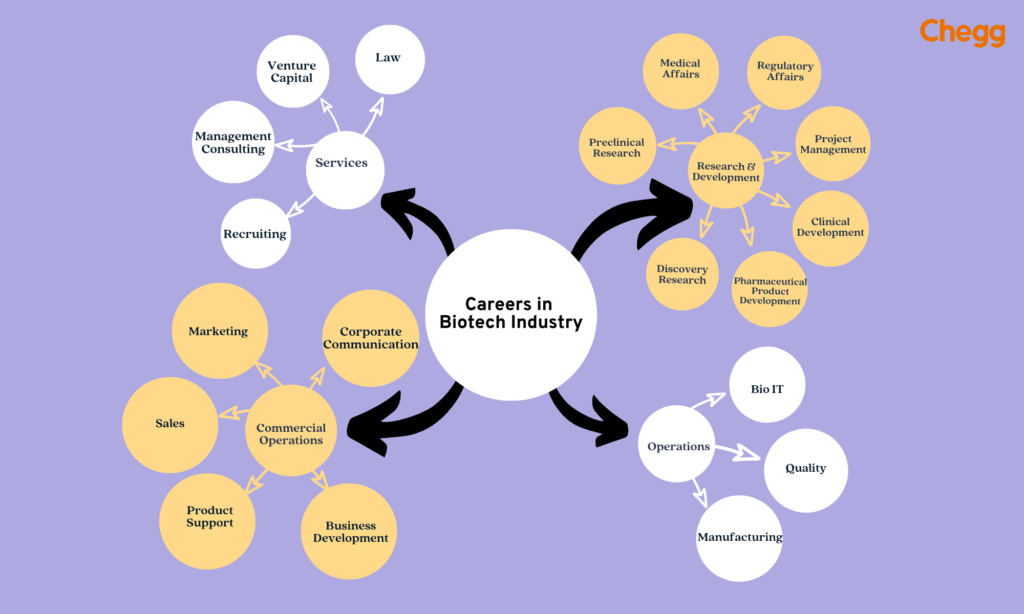

Quick Summary
- With an 11.8% CAGR in the biotech market, opportunities are numerous for BSc Biotechnology graduates.
- The course covers diverse subjects like Genetics, Immunology, and Industrial Biotechnology, preparing you for roles such as a Lab Technician, Epidemiologist, or Quality Controller.
- Top colleges include JMI New Delhi and Fergusson College Pune. Graduates can explore careers in agriculture, medicine, or environmental protection, or opt for roles in leading firms like Biocon or Bharat Biotech.
Table of Contents
Tracking attendance with biometric systems in offices, developing recyclable plastics using synthetic organisms, and creating artificial intelligence for the medical field—these groundbreaking innovations are all the result of the work done by biotechnologists.
If you’re passionate about making a career in this transformative field, pursuing a BSc in Biotechnology is an excellent point to start.
The biotechnology industry is booming, with a CAGR (Compound Annual Growth Rate) of 11.8%, indicating that the market is poised for significant growth. This expansion opens up a wealth of opportunities for professionals in this area. To capitalize on these opportunities, a bachelor’s degree in biotechnology provides the foundational knowledge and skills needed.
In this course, you’ll explore various aspects of biotechnology, from genetic engineering to bioprocessing, and discover diverse career options after B Sc Biotechnology such as research, healthcare, pharmaceuticals, and environmental conservation. Whether you aspire to work in a laboratory or lead innovative projects in the industry, a BSc in Biotechnology can set you on the right path.
B Sc Biotechnology Course Details
Biotechnology is a branch of applied biology that involves the deliberate and controlled manipulation of biological systems, such as cells or their components, to develop or process a wide range of valuable products and technologies.
The BSc Biotechnology course is a 3-year undergraduate program designed to teach students how to harness technology to develop essential products from living organisms. This course provides a comprehensive understanding of the intersection between biology and technology, covering topics such as genetic engineering, molecular biology, and bioprocessing.
Every year, approximately 40,000 students enroll in this undergraduate course across India. To be eligible for a BSc in Biotechnology, candidates must have completed their 10+2 level examination from a recognized board of education. Aspiring students are required to have Biology, Physics, and Chemistry as compulsory subjects in their 10+2 curriculum.
Why choose BSc Biotechnology
- Biotechnology is an emerging discipline that is rapidly expanding in India and around the world. Obtaining a BSc Biotechnology degree is an excellent way to get engaged in this vibrant and continually changing field. You can work as a scientist, researcher, or entrepreneur in fields such as food production, agriculture, and medicine. Other reasons to choose this course include:
- India is one of the top twelve most popular biotech locations in the world, and the third largest in the Asia Pacific region.
- In accordance with an IBEF investigation, “the Department of Biotechnology was granted US$ 343.56 million in the Union Budget of 2022-23 for establishing fundamental infrastructure, genetic engineering, bioinformatics, agriculture biotechnology, and so on.”
- Employment in the Indian biotechnology industry is expected to grow by 19% by 2025.
Career Options After B Sc Biotechnology: Course Highlights
Now, let’s look at the biotech course details in the table below.
| Course Level | Undergraduate |
|
Course Duration |
Bachelor of Science Biotechnology |
|
Full Form |
3 years |
|
Eligibility | Candidates must clear the 12th or an equivalent exam with a minimum of 55-60% marks. Some colleges also conduct an entrance admission test for admission. |
|
Subjects |
Plant Biotechnology, Principles of Immunology, Genetics, etc. |
|
Top Colleges |
JMI New Delhi, Mount Carmel College, St. Xavier College, Fergusson College, etc. |
|
Average Annual Fees |
Rs. 25,000 to 7,00,000 |
|
Top Recruiting Sectors |
Chemical Manufacturers, Biotechnology Consultation Agencies, Animal Husbandry, Hospitals, etc. |
|
Job Positions |
Lab Technician, Research Scientist, Biotech Analyst, Epidemiologist, etc. |
|
Average Annual Salary | Around Rs. 5.7 lakhs |
Also Read:
BTech Biotechnology – Course Details and Jobs
BSc Courses and Jobs in India

Career Options After B Sc Biotechnology: Syllabus and Subjects
A Bachelor of Science in Biotechnology course is generally three years. These three years are divided into six semesters. BSc biotechnology covers various subjects in each semester. Read the list of semester-wise distribution of the most common subjects below:
Semester 1
|
Chemical and Physical Biology |
|
Introduction to Biotechnology and Cell Biology |
|
Biochemistry |
|
Fundamentals of Microbiology |
|
Introduction to Computer Science |
|
Biophysics and Instrumentation |
|
Macromolecular Analysis and Structure |
|
Cell Dynamics and Structure |
|
Biophysical Chemistry |
|
Biomathematics |
|
Genetics and Cell Biology |
Semester 2
|
Principles of Transmission Genetics |
|
Introduction to C-Programming and Digital Logic. |
|
Principles of Microbiology |
|
Organic Mechanisms in Biology |
|
Fundamentals of Biocomputing, Biostatistics, and Biochemistry |
|
Chemistry and Microbial Physiology |
|
Cytogenetic Techniques |
Semester 3
|
Principles of Immunology |
|
Microbial Genetics |
|
Plant Biotechnology |
|
Animal and Plant Tissue Culture- Techniques and Applications |
|
Fundamentals of Molecular Biochemistry |
|
Microbial Diversity |
|
Cellular Metabolism |
Semester 4
|
Molecular Biology Techniques |
|
Biodiversity and Taxonomy |
|
Animal Biotechnology |
|
Computational Biology and Bioinformatics |
|
Protein Science |
|
Molecular Genetics |
|
Introduction to Computer Networking, Numerical Analysis, and DBMS |
|
Environmental Biotechnology |
|
Bioinformatics and Analytical Techniques |
|
Genomics – Integrative Cell Biology |
Semester 5
|
Recombinant DNA Technology |
|
Industrial Biotechnology |
|
Environmental Biotechnology |
|
Immunology |
|
DNA Typing and Proteomics |
Semester 6
|
Model Organisms in Human Genome |
|
Introduction to Entrepreneurship |
|
Medical Biotechnology |
|
Element Management |
|
Applications of Biotechnology (Animals and Plants) |
|
Biotechnology – Ethical, Social, and Legal Issues |
|
Advanced Molecular Techniques |
|
Analytical Techniques |
|
Bioinformatics |
Read About More Branches of BSc Below:
Careers and Courses After BSc Nursing
Best Course to Do After BSc Botany
What To Do After BSc Chemistry?

Difference Between BSc Biotechnology and BSc Biology
Both BSc Biotechnology and BSc Biology are 3-year-long undergraduate courses with some similarities. Read below to know about the differences between the two courses:
|
BSc Biotechnology |
BSc Biology |
Biotechnology is a branch of biology |
Biology is a branch of science |
|
Biotechnology deals with the study of living organisms |
Biology deals with using living organisms to develop various products for human benefit. |
|
Biotechnology is based on botany and zoology. |
Biology is based on modern advancements in medical procedures and medicine. |
|
Biotechnology has more scope because it is a technical field. |
Biology has less scope than Biotechnology because it isn’t a technical field. |
Career Options After B Sc Biotechnology: Top Colleges
In India, there are around 1268 colleges that offer BSc biotechnology courses to aspiring candidates. Read about the top 5 BSc Biotechnology colleges in India below:
|
Institute Name |
No. of Seats |
Mode of Admission |
Estimated Fees (in INR) |
|
Fergusson College, Pune |
45 |
Merit-list based |
26,355 |
|
JSS Academy of Higher Education and Research, Mysore |
40 |
Merit-list based |
1.15 lakhs |
|
St. Xavier’s College, Ahmedabad |
45 |
Merit-list based |
29,995 |
|
JMI, New Delhi |
35 |
Merit-list based |
24,000 |
|
Loyola College, Chennai |
70 |
Merit-list based |
34,680 |

Career Options After B Sc Biotechnology: Job Opportunities
|
Job Profile | Average Salary (INR) |
|
Lab Technician |
2.1 LPA |
|
Microbiologist |
2.4 LPA |
|
Biostatistician |
4 LPA |
|
Epidemiologist |
6 LPA |
|
Biochemist |
2.4 LPA |
|
Clinical Research Analyst |
4 LPA |
|
Medical Representative |
2.5 LPA |
|
Medical Writer |
4.6 LPA |
|
Biotechnology Instructor |
4.9 LPA |
|
Quality Controller |
2 LPA |
Source: Ambitionbox, Payscale
1. Lab Technician
A Lab Technician, also known as a Laboratory Technician, works in laboratory settings. They usually work on behalf of various healthcare facilities. A biotechnology laboratory technician also assists scientists in conducting various research activities.
Roles and Responsibilities
The roles and responsibilities of a Lab Technician are as follows:
- Collecting, preparing, and analyzing body samples, such as tissues and blood.
- Maintaining laboratory equipment.
- Procuring laboratory supplies.
2. Microbiologist
A Microbiologist studies various microorganisms such as viruses, bacteria, and fungi. Microbiologists try to understand how microorganisms grow, interact, and live in various environments. Microbiologists often work in laboratories, universities, research institutes, and industry settings, where they conduct experiments, analyze data, and develop new techniques to study microorganisms.
Roles and Responsibilities
The roles and responsibilities of a Microbiologist are as follows:
- Tracking the development of environmental microorganisms.
- Growing microbe cultures.
- Writing research papers, reviews, and reports.
3. Biostatistician
Biostatisticians collect and analyze data for public health purposes using statistics and math. They determine the factors influencing the health and overall well-being of animals, humans, and ecology. Using this knowledge, they publish studies, predictions, and statistics on diseases and other health risks.
Roles and Responsibilities
The roles and responsibilities of a Biostatistician are as follows:
- Develop various methodologies for data collection.
- Design clinical trials to evaluate new drugs.
- Provide biostatistical consultations to clients.
4. Epidemiologist
The job of an epidemiologist is to find the source of the outbreak of various contagious diseases. They also try to identify those at risk from such outbreaks and figure out strategies to prevent the spread of contagious diseases. They might work in hospitals or teach in universities.
Roles and Responsibilities
The roles and responsibilities of an Epidemiologist are as follows:
- Create and manage various public health programs.
- Analyse data and come to conclusions by performing laboratory tests.
- Trace the root causes of multiple diseases/infections.
5. Biochemist
Biochemists study the physical, chemical, and biological properties of living organisms, such as cell development, heredity, and growth. They study the occurrences of various chemical reactions in the tissues of living organisms and the effects of medicines on their tissues.
A biochemist aims to improve the quality of human life by studying living organisms at the molecular level.
Roles and Responsibilities
The roles and responsibilities of a Biochemist are as follows:
- Writing scholarly articles about their research findings.
- Raising funds for research projects.
- Studying the chemical processes, functions, and composition of living organisms.
Recommended Read: Best Career Options for You After BSc Biology
6. Clinical Research Analyst
Clinical research analysts work on various medical research projects to evaluate the efficiency and safety of various medical devices and drugs. They typically work with clinical trial coordinators, nurses, doctors, and other healthcare professionals.
Roles and Responsibilities
The roles and responsibilities of a clinical research analyst are as follows:
- Recording research findings in a notebook or database for future reference.
- Conducting laboratory tests such as urinalysis and blood work.
- Coordinating clinical research studies by identifying and interacting with patients, collecting data, and tracking inventory.
7. Medical Representative
BSc Biotechnology graduates can also work as medical representatives. Medical representatives promote and sell pharmaceutical companies’ medications, medical equipment, and prescription drugs. They work as mediators between pharmaceuticals, healthcare professionals, and medical companies.
Roles and Responsibilities
The roles and responsibilities of a medical representative are as follows:
- Researching the performances of rival companies’ medications in the market.
- Developing and maintaining strong business relationships with customers to encourage them to be a repeat customer.
- Scheduling appointments with various healthcare professionals such as pharmacists and doctors to promote a company’s medications.
8. Medical Writer
BSc Biotechnology graduates with a flair for writing can work as medical writers once they finish their course. A medical writer creates well-structured documents that include content for healthcare websites, clinical research, health magazines, news articles, and journals.
Medical writers write both non-regulatory and regulatory articles. Regulatory materials include documents written for regulatory agencies to seek approval for multiple drugs and devices. Such documents include study reports, clinical trial protocols, etc. Non-regulatory materials include promotional and educational content.
Roles and Responsibilities
The roles and responsibilities of a medical writer are as follows:
- Monitoring deadlines to ensure that projects are delivered on time.
- Liaising directly with authors/speakers and clients on various projects.
- Assisting junior writers.
9. Biotechnology Instructor
After obtaining a degree in Biotechnology, graduates can become Biotechnology Instructors. Biotechnology Instructors are tutors who deliver engaging lectures on various concepts in the field of biotechnology. A biotechnology instructor works in educational institutions such as schools, colleges, and universities.
Roles and Responsibilities
The roles and responsibilities of a Biotechnology instructor are as follows:
- Maintain lab equipment for inventory purposes.
- Conduct skill assessment tests.
- Develop course material.
10. Quality Controller
After completing a Bachelor’s in Biotechnology, graduates can become quality controllers. Quality controllers ensure that the quality of a company’s drugs and goods comply with organizational standards. They ensure that manufactured drugs and other products are safe and therapeutically active.
Roles and Responsibilities
The roles and responsibilities of a Quality Controller are as follows:
- Resolving various quality-related issues.
- Training the quality assurance team.
- Preparing documentation about the process of inspection.
Jobs after BSc Biotechnology: Sector Wise
| Government Jobs after B.Sc Biotechnology | Average Salary |
|---|---|
| Consultant-Epidemiologist | INR 5.1 – 6.6 LPA |
| Biostatistician | INR 3.8 LPA |
| Clinical Research Manager | INR 2.3 LPA |
| Food Safety Officer | INR 4.2 LPA |
| BSc Biotechnology Private Jobs | Average Salary |
|---|---|
| Research Associate | INR 4.1 LPA |
| Medical Coder | INR 2.6 LPA |
| Clinical Instructor | INR 2 LPA |
| Safety Officer | INR 2.8 LPA |
Career Options After B Sc Biotechnology: Top Recruiters for Graduates
- Biocon
- Serum Institute of India
- Bharat Biotech
- Cadila Healthcare
- Lupin Limited
- Wockhardt Limited
- Dr Reddy’s Laboratories
- Sun Pharmaceutical Industries
- Reliance Life Sciences
- Syngene International
Career Options After B Sc Biotechnology: Scope
Bachelor of Science in Biotechnology graduates have a vast career scope. Some career options after B Sc Biotechnology are:
- Agriculture: BSc Biotechnology graduates are in high demand in the agricultural sector. Biotechnology is extensively used to enhance crop yields, develop genetically modified crops, and create methods to protect crops from pests and diseases. Professionals in this field work on improving food security and developing sustainable agricultural practices.
- Medicine: The medical field offers numerous opportunities for biotechnology graduates. They play a vital role in the development of new drugs, gene therapy, diagnostics, and medical devices. Their expertise is also crucial in researching to understand diseases, discover new treatment methods, and improve healthcare outcomes.
- Food production: Biotechnology is key in the food industry, where it is used to improve the safety, quality, and nutritional value of food products. Graduates can work in food technology, developing new food products, enhancing food preservation methods, and ensuring food safety through microbiological testing.
- Environmental protection: Environmental biotechnology is another area where graduates can contribute significantly. They work on developing innovative solutions to reduce pollution, manage waste, conserve energy, and create sustainable ways to grow food. This includes bioremediation techniques, renewable energy projects, and the development of eco-friendly materials.
Recommended Reads:
How Much You Can Earn After BSc Agriculture?
Career in BSc Nutrition and Dietetics in India
Career Options After B Sc Biotechnology: Boost Your Career
BSc Biotechnology is rapidly emerging as one of the most lucrative fields to build a career. There are several career prospects like quality controller, lecturer, biochemist, medical writer, etc.
If you’re not inclined to pursue a traditional job, there are still numerous alternative career opportunities available to you in fields like agriculture, food production, environmental protection, and beyond.
Evaluate numerous career choices to choose the right career path for yourself. Dive into our guide on Career Advice.
Career Options After B Sc Biotechnology: FAQs
Is BSc Biotechnology a good career?
Yes, BSc in Biotechnology is a good career option to choose. It is an undergraduate program which offers lucrative job opportunities. After completing the biotechnology course, you will get career opportunities that include:
1. Microbiologist
2. Biochemist
3. Medical writer
4. Medical Representative
What are BSc Biotechnology subjects?
The BSc Biotechnology course is divided into 6 semesters which have different subjects. Some of these subjects are:
1. Chemical and Physical Biology
2. Introduction to Computer Science
3. Principles of Transmission Genetics
4. Cytogenetic Techniques
5. Principles of Immunology
6. Fundamentals of Molecular Biochemistry
7. Biodiversity and Taxonomy
8. Recombinant DNA Technology
9. Applications of Biotechnology (Animals and Plants)
10. Advanced Molecular Techniques
What is the salary after BSc in Biotechnology?
Biotechnology course graduates are always in demand by various industries that offer them high-paying jobs. On average, a biotechnology graduate can earn around 2LPA to 5LPA. Your pay will increase as you gain experience.
What can I do after my BSc in Biotechnology?
After graduating with a BSc in Biotechnology, you can choose from a wide variety of career options. Some of the job opportunities that are available for a BSc Biotechnology graduate are:
1. Biostatistician
2. Biochemist
3. Microbiologist
4. Biomedical Engineer
5. Lab technician
6. Epidemiologist
7. Medical content writer
To read more related articles, click here.
Got a question on this topic?